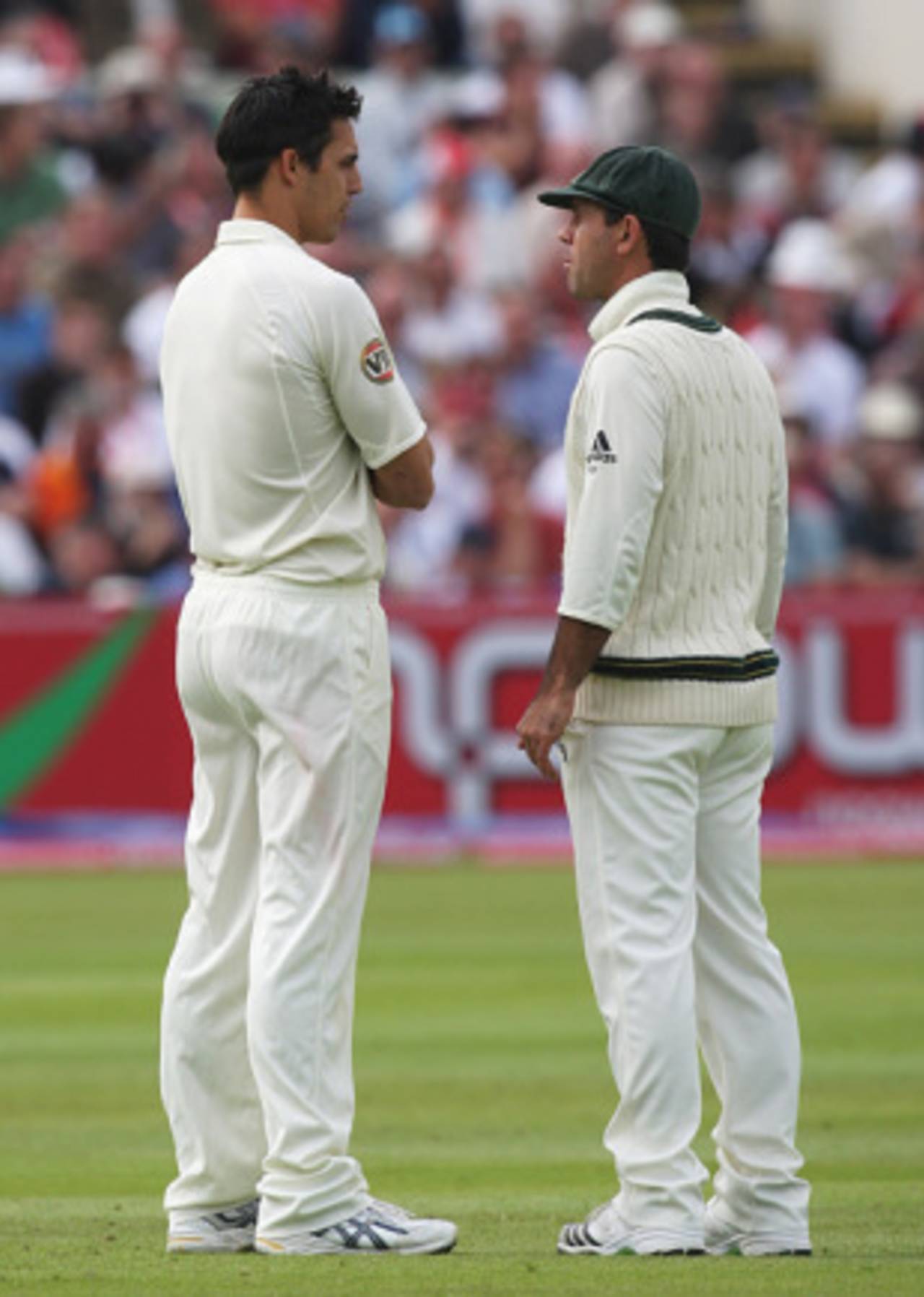A tall man and a redhead walked around the outfield to hand Ben Hilfenhaus a drink and a towel early in England's first innings. Stuart Clark and Andrew McDonald were the delivery men, looking reasonably cheerful considering their side's predicament and their lack of on-field action. Neither bowler can get a game despite the state of Australia's mis-firing attack and the seriousness of the series situation.
In Edgbaston the tourists gambled with their batting but not their bowling, preferring to maintain the combination which did so well in South Africa. Remember South Africa? The selectors still have the postcards on their fridges. The times were so good that none of them bother peering back to a time when Clark was a regular who averaged four wickets a game and had a career economy rate of 2.54. Previously he made a breakthrough every 23 runs. On this trip he dispenses refreshments.
How Australian supporters, if not the selectors, would enjoy having such a dependable bowler running in at Edgbaston. In conditions even a pessimist would describe as favourable, Mitchell Johnson, Peter Siddle and Ben Hilfenhaus were virtually impotent. Most worryingly, they didn't operate in tandem. While Siddle gave away nothing, Hilfenhaus offered too many boundary opportunities, choosing a poor time for a bad afternoon, and Johnson soon became weighed down despite a slight improvement.
All three were excited watching James Anderson and Graham Onions curve the ball around corners, into stumps and on to edges as England detonated their opponents for 263. Seven wickets fell in the opening session, with four the result of significant movement through the air. Batsmen weren't sure whether to play or leave and suffered in their muddled state. Andrew Strauss was rarely confused as he guided England's reply.
Until now the Australians could have argued successfully that England had the best of conditions during the series. At Lord's the visitors had to bat on the cloudy days when the ball arced teasingly, and bowled on the sunny ones when it didn't. On today's form the difference between the teams is skill, local knowledge and self-belief. Both Onions and Anderson had quiet opening Tests, but both forgot their problems and found severe danger.
Australian bowlers are usually into-the-wicket operators, searching for seam movement and variation in bounce instead of swerve in the air. When it comes to swinging the ball they are always behind. It happened here in 2005 and last year in India, when reverse-swing was such a weapon, and now it's occurring with traditional curl. Even Hilfenhaus, the best bowler of the tour and an outswinger by trade, was unthreatening in the gloom that hung around throughout the day.
They have a lot more to talk about with Troy Cooley, the bowling coach, after being out-thought and out-played. Four summers ago Cooley was England's miracle worker and was poached back by his home country, but on this tour he is well behind Otis Gibson, his opposite number.
Having seen Anderson and Onions pitch the ball up, the Australians tried instead to mirror Andrew Flintoff's shorter length and were taken for 116 runs. There is not a lot in the pitch but, as England showed, there is so much in the air. Siddle picked up Alastair Cook in his first over with a ball that was well pitched up, but the method wasn't continued with often enough. The ball is 36 overs old and Ricky Ponting hopes it will start to wobble in the morning. "There will be no excuses," Ponting said, "unless the ball gets wet."
Siddle and Hilfenhaus took the new one, with Johnson relegated to first-change, and they ran in without creating too much discomfort. The Duke ball doesn't usually swing early in England due to its lacquer, but for Australia it didn't curve a lot when it came off. The hosts were well on top when the light became too bad and the tourists had wasted a prime opportunity, just as their batsmen had earlier in the day. The two camps can spend the night pointing figures at each other for their worsening position.
In the field the only bright sign was the improved accuracy of Johnson, although it was still not enough to justify his place after his Lord's horror. With Clark fit and strong, Johnson, out-of-form and weak in spirit, kept his spot and spent most of the afternoon warding off back-slappers who were employed to brighten his mood.
He delivered six overs for 23 and peaked when he hit Ian Bell on the glove with a steepling short ball and had a thoroughly convincing lbw appeal turned down in the next over. "Those things tend to happen when you're going through a bit of a rough trot," Ponting said. "If that decision had gone his way tonight then that might have been exactly what he needed."
Two deliveries after the appeal Bell eased him through cover for four and the following shot was misfielded in the same area, sending Johnson's shoulders southward and his leg kicking out. Johnson had been welcomed by ironic cheers and sung at as "Super Mitchell Johnson", but Ponting was much happier with his performance and outlook.
"He's really taken it upon himself with his body language and his attitude to get that a little bit better," he said. "As a result I think he'll be a bit more confident within himself and that's what he needs right at the moment." However, after a first-ball duck when he offered no shot and was lbw - it was slightly high, but looked terminal before the replays - his steps are currently too small to save his team's Ashes campaign.
Clark helped Australia win in 2006-07, knows these conditions and is immensely reliable. He wouldn't have provided the answer to the lack of swing, but he would have been steady and challenging throughout all of his overs. His selection would have been safe. Australia may be sorry.
Peter English is the Australasia editor of Cricinfo
